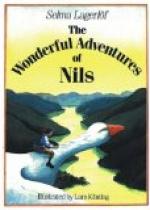“What do they do?” asked the boy. “What do they do?”
“They raise cattle and fell forests,” cawed the crow.
“Thanks,” replied the boy. “You answer well.”
A bit farther on he heard a human voice yodeling and singing down in the mist.
“Is there any large city in this part of the country?” the boy asked.
“What—what—who is it that calls?” cried the human voice.
“Is there any large city in this region?” the boy repeated.
“I want to know who it is that calls,” shouted the human voice.
“I might have known that I could get no information when I asked a human being a civil question,” the boy retorted.
It was not long before the mist went away as suddenly as it had come. Then the boy saw a beautiful landscape, with high cliffs as in Jaemtland, but there were no large, flourishing settlements on the mountain slopes. The villages lay far apart, and the farms were small. Bataki followed the stream southward till they came within sight of a village. There he alighted in a stubble field and let the boy dismount.
“In the summer grain grew on this ground,” said Bataki. “Look around and see if you can’t find something eatable.”
The boy acted upon the suggestion and before long he found a blade of wheat. As he picked out the grains and ate them, Bataki talked to him.
“Do you see that mountain towering directly south of us?” he asked.
“Yes, of course, I see it,” said the boy.
“It is called Sonfjaellet,” continued the raven; “you can imagine that wolves were plentiful there once upon a time.”
“It must have been an ideal place for wolves,” said the boy.
“The people who lived here in the valley were frequently attacked by them,” remarked the raven.
“Perhaps you remember a good wolf story you could tell me?” said the boy.
“I’ve been told that a long, long time ago the wolves from Sonfjaellet are supposed to have waylaid a man who had gone out to peddle his wares,” began Bataki. “He was from Hede, a village a few miles down the valley. It was winter time and the wolves made for him as he was driving over the ice on Lake Ljusna. There were about nine or ten, and the man from Hede had a poor old horse, so there was very little hope of his escaping.
“When the man heard the wolves howl and saw how many there were after him, he lost his head, and it did not occur to him that he ought to dump his casks and jugs out of the sledge, to lighten the load. He only whipped up the horse and made the best speed he could, but he soon observed that the wolves were gaining on him. The shores were desolate and he was fourteen miles from the nearest farm. He thought that his final hour had come, and was paralyzed with fear.
“While he sat there, terrified, he saw something move in the brush, which had been set in the ice to mark out the road; and when he discovered who it was that walked there, his fear grew more and more intense.




